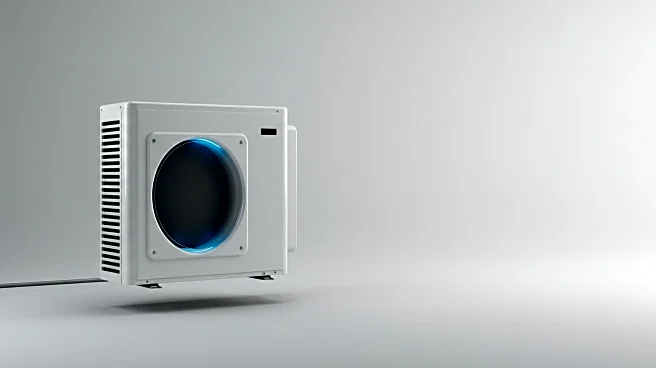What's Happening?
Federal incentives for home energy improvements, including heat pumps, are set to expire at the end of the year, prompting homeowners to consider their options. Heat pumps, known for their climate-friendly benefits, come in two main types: air source and ground source. Air source heat pumps are more affordable and space-efficient, while ground source heat pumps offer greater efficiency in extreme weather but are costlier to install. Bill Gerosa, a homeowner near New York City, invested $13,000 in a ground-source heat pump, significantly reducing his energy costs with the help of state and utility incentives. Advances in technology have improved heat pump efficiency, making them viable even in extreme temperatures.
Why It's Important?
The expiration of federal incentives could impact the adoption rate of heat pumps, which are cleaner and more efficient than traditional heating systems. Heat pumps have outsold furnaces since 2021, indicating a shift towards greener energy solutions. The transition to heat pumps can reduce emissions, especially in states with milder climates and renewable energy sources. The decision to switch can lead to long-term savings and environmental benefits, but upfront costs and availability of skilled installers remain challenges. As the deadline approaches, homeowners must weigh the financial and environmental advantages against installation costs.
What's Next?
Homeowners considering heat pumps must act quickly to take advantage of federal incentives before they expire. The demand for heat pumps may increase, potentially driving up installation costs and affecting availability of skilled technicians. As heat pumps become more common, HVAC professionals are adapting to the technology, though ground-source installations remain less accessible. The industry may see further growth in heat pump adoption, driven by environmental benefits and long-term savings. Stakeholders, including policymakers and environmental groups, may push for extended incentives to support the transition to cleaner energy solutions.
Beyond the Headlines
The shift towards heat pumps reflects broader trends in energy efficiency and climate-conscious home improvements. As technology advances, heat pumps could play a significant role in reducing reliance on fossil fuels and lowering carbon footprints. The transition may also influence the HVAC industry, encouraging innovation and adaptation to new technologies. Ethical considerations around energy consumption and environmental impact may drive further policy changes and consumer behavior. Long-term, the adoption of heat pumps could contribute to national goals for emissions reduction and sustainable energy use.









